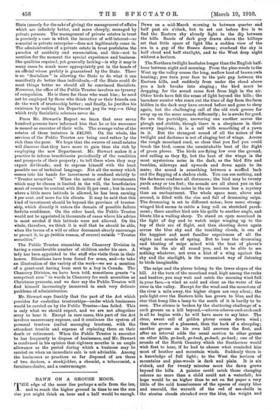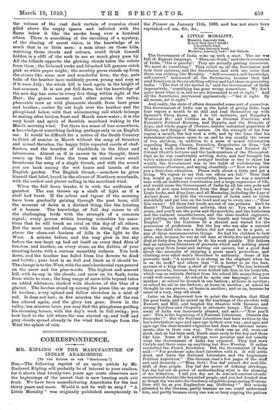DAWN ON A GROUSE MOOR.
edge of the moor lies perhaps a mile from the inn, -L and to reach the higher ground in time to see the sun rise you might think an hour and a half would be enough. Dawn on a mid-March morning is between quarter and half past six o'clock, but to set out before five is to find the Eastern sky already light in the dip between the hills. Bands of dark grey drawn above the hilltops set that little space of light like a sudden view of the sea in a gap of the Sussex downs ; overhead the sky is half cloud and half starlight, and to the West deep night without a horizon.
The Northern twilight hesitates longer than the English half- hour between night and morning. From the pine-woods to the West up the valley comes the long, mellow hoot of brown owls hunting; you turn your face to the pale gap between the Eastern hills, and suddenly from under the cloud above you a lark breaks into singing ; the bird must be dropping, for the sound came first from high in the air. Other birds have felt the sense of light beyond the hills ; the barndoor rooster who roars out the time of day from the farm hidden in the dark may have crowed before and gone to sleep again, but the challenging call of the old cock grouse far away up on the moor sounds differently ; he is awake for good. So are the partridges, answering one another across the plough and stubble, though there is a sleepiness in their screwy inquiries ; it is a call with something of a yawn in it. But the strangest sound of all the noises of the twilight and darkness is not of singing but of wings. Across the rough moorland road, so close that you feel you could touch the bird, comes the unmistakable beat of the flight of green plover. The birds are flying low over the ground, and calling as they fly, but the beat of the wings is the most mysterious noise in the dark, as the bird flits and tumbles, sideways and upwards and down again to its mate; the sound is something between a muffled bark and the flapping of a shaken cloth. You can see nothing, and the darkness confuses all distances; the bird may be twenty yards away or ten feet ; the sounds are all about you on the road. Suddenly the noise in the air becomes less a mystery than an enchantment. The whole space near, above and around, is filled with the rise and fall of drumming snipe. The drumming is set to different notes; here some strong- winged bird seems to rattle a long roll on stretched parch- ment ; there another bird sets his quills to another angle, and bleats like a wailing sheep. To stand on open moorland in the light of day and to watch snipe winging up to the top of their arc of flight, and then shooting down again across the blue sky and the tumbling clouds, is one of the happiest and most familiar experiences of all the sights and sounds of spring. But to hear the drumming and bleating of snipe mixed with the beat of plover's wings in the air all round 'you, and to be able to see nothing whatever, not even a hint of a wing against the sky and the starlight, is the uncanniest way of listening to birds imaginable.
The snipe and the plover belong to the lower slopes of the hill. At the turn of the moorland road, high among the rocks and heather, you may wait and catch the morning wind full in your face,—a wind as cold and clear as the water of the river in the valley. Except for the wind and the monotone of the river a mile away, the higher slopes are very silent ; the pale light over the Eastern hills has grown to blue, and the star that hung like a lamp to the south of it is hardly to be seen. The silence is broken by the chattering challenge of a cock grouse on a hill beyond,—wherra-wkerra-cock-cock-cock is all he begins with ; he will have more to say later. The clear, sweet call of golden plover comes down wind ; then the crow of a pheasant, then the bark of a sheepdog; another grouse on his own hill answers the first, and after an interval adds the usual caution to other grouse on other hills, go-back, go-back, go-back, go-back ; one of the sounds of the North Country which the Southerner would wish first to hear, if he had to choose what reminded him most of heather and mountain winds. Suddenly there is a knowledge of full light ; to the West the horizon of mountains and pine-woods is dark and plain. It is six o'clock, and for twenty minutes more the dawn grows beyond the hills. A painter could catch those changing colours no more than a child could net a waterfall; his hope would be no higher than to set on flat paper a very little of the cold translucence of the spaces of empty blue and emerald, the warmth of the red of sea-shells in the stratus clouds streaked over the blue, the weight and the volume of the vast dark curtain of cumulus cloud piled above the empty spaces and infected with the flame below it like the smoke hung over a hundred altars. There is something of the unveiling of a mystery, of the sharing of secret vision, in the knowledge of so much that is so little seen : a man alone on those hills, watching those clouds and colours, could think himself hidden in a clift of the rock to see so much glory pass by. All the hillside opposite the glowing clouds takes the colour from them ; the lichened rocks and bleached hill grasses catch pink as white paper might; the scrubby gorse stands up from the stones like some new and wonderful fern; the dry, pale bells of the heather have suddenly grown young and rosy as if it were July; the whole hill is back again in the height of last summer. It is not yet full dawn, but the knowledge of the new day has come to every live thing within sight of the East ; the grouse answer each other across the valley, pheasants crow as wild pheasants should, from bare grass and heather ; curlew fly out high over the heather and the ploughland below, with that whimmering call which belongs to mating after broken frost and March snow-water; it is the very heart and spirit of Scottish moorland waking in the March morning wind. Yet there is a sense of loss somewhere, a knowledge of something lacking, perhaps only to an English ear. It would be difficult for a native of the South Country to think of sunrise in March without the song of thrushes and missel thrushes, the happy little repeated carols of chaf- finches, and the bourdon of blackbirds in the lilacs and laburnums. Almost as if in answer to the thought, there comes up the hill from the trees set round some small farmhouse the song of a single thrush, and with the sound you are back among the wet boxes and laurels of the English garden. The English thrush,—somehow he gives himself that label, heard in the silence of Northern moorlands, with the curlew and plover calling in the moorland wind.
When the full dawn breaks, it is with the swiftness of gunshot. The sun throws up a shaft of light as if a shell had burst. If the colour and vigour of the morning have been gradually gaining through the past hour, still the moment of dawn is a distinct thing, like the hoisting of a banner. The knowledge of full day comes to all the challenging birds with the strength of a common signal ; every grouse within hearing redoubles his asser- tions that he will brook no rival on this day of all others. But the most marked change with the rising of the sun above the clean-cut horizon of hills is the light to the West. A minute before, and the rosy glow in the sky before the sun leapt up had set itself on every dead fibre of bracken and heather, on every stone, on the dubbin of your shooting-boots, with a curious unearthly redness. You look down, and the heather has faded from live flowers to dead and brittle ; your boot is as dull and black as it should be. The change is to the West, with the sun's horizontal rays poured on the snow and the pine-woods. The highest and nearest hill, with its cap in the clouds, and snow on its flank, turns from white to rose ; the long range of snow-hills beyond takes an added whiteness, slashed with shadows of the blue of a glacier. The larches stand up among the pines like so many lit torches ; every upland and fallow stretches in a mist of red, It does not last; in five minutes the angle of the sun Las altered again, and the glory has gone. Down in the valley, ten minutes later, you may find the ploughman guiding his steaming horses, with the day's work in full swing; you look back to the bill where the sun started up, and buff and grey clouds spread already in the wind that brings from the West the splash of rain.











































 Previous page
Previous page